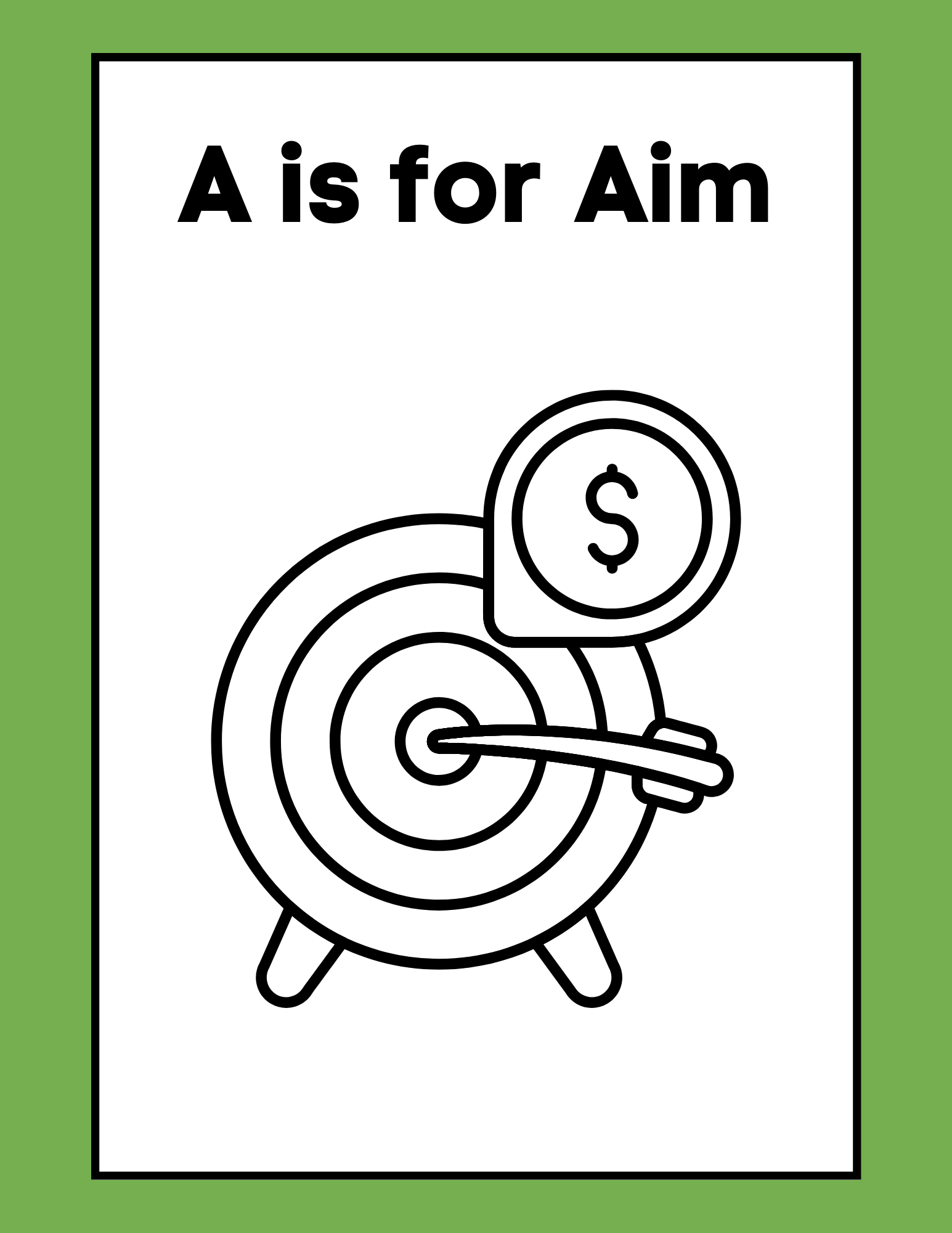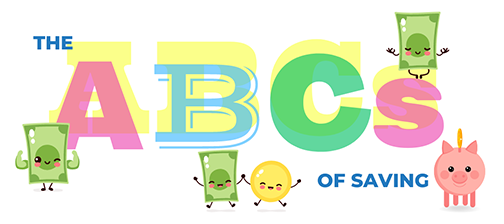Money makes the world go around—or so the saying goes. Fortunately, April is Youth Savings Month, so now is a great time to set some big goals for yourself. If you are tired of begging mom or dad to fork over cash for the things you want, take charge and set your own savings goal. Need some help? Take a moment to learn the ABCs of saving.
How to Set a Savings Goal
Picture something you really want. Do you know how much it costs? Chances are, if you want to get it, you need some money. Maybe a lot of money.
Want to buy a new bicycle? A new PlayStation? Set aside just a little bit of your allowance, birthday money, or chore money, and it eventually adds up. To reach your goal faster, you need a savings goal. So, figure out how much you need to save and set a timeline. For example, if you want to save $200 by the end of summer, you’ll need to save $40 each month between April and August. It may sound hard, but if you follow the ABCs of saving, it will be easier.
At Maps, we want to help you reach your goals. So, we have a savings account designed to help you do that. Plus, we’ve got special rewards to keep you motivated. Each time you make a deposit into your Maps account, you’ll earn stamps that you can redeem for carousel tickets, ice cream, movie tickets, Amazon gift cards, and more.
Once you’ve set your savings goal, tell us all about it! Enter our Youth Savings Month Contest and you could win $100! We will announce the winners on Wednesday, April 26, 2023, via our Facebook and Instagram.

A
A is for Aim. Give yourself a goal to strive for. Think of something you would like but can’t afford now.

B
B is for Budget. Before you start saving money, it’s important to know how much you are spending already and how much money you would need to save each week to reach your bigger goals.

C
C is for Cutting Back. Saying no to spending money is hard—especially when you have money in your hand. In those moments, it’s good to remember that those wanting feelings will pass. In the long run, you will feel proud of yourself for making smart choices.

D
D is for Deposit. A deposit happens when you bring your money into the credit union and add it to your account. Every time you make a deposit into your Maps account, your savings will grow. Not only does it help you save toward your bigger goal, it also keeps your money safe from being lost (or spent on silly things).

E
E is for Emergency Fund. An emergency fund is money you set aside for unexpected things. If you don’t have something big you are saving for, consider setting aside an emergency fund. If something happens (like you lose a library book and have to replace it), your emergency fund will be there to take care of the problem.

F
F is for Fun. Saving money doesn’t mean depriving yourself of fun. Treat yourself to something fun every once and a while. It is important to reward yourself for the hard work you are doing.

G
G is for Growth. Growing your savings takes time and dedication, but you can do it and the rewards are worth it. It’s not about achieving your goal quickly, it is about the small steps you make along the way.

H
H is for Habits. A habit is something you do over and over again. When you develop a habit, you do it without thinking about it. Habits can be good or bad, but once they are established, they are hard to break. Think about your spending habits. Are they helping you or holding you back?

I
I is for Income. Your income is the collection of all the resources you bring in. Do you get an allowance? That is part of your income. Do you get money for doing chores? That is also part of your income. Did you get money from a relative for your birthday? Add it to your income.

J
J is for Journal. Maybe you already have a diary where you can record your thoughts and feelings, but keeping a journal of your saving and spending habits can help you stay on track. Each time you save money, write down the date, the amount, and where the money came from. It’s a good way to see how all your money adds up and how much more it will take to reach your goal.

K
K is for Keeping Track. Track your progress so you can see how far you have come and how close you are getting to your goal. It feels good to make progress and you may soon realize that keeping track of your progress helps you stay motivated to keep going.

L
L is for Lend. Lending is what happens when one person borrows money from another person or business and promises to pay it back. Lending is when your mom or dad borrows money from the credit union to fix up the house. If you give your brother $5 to buy something because he doesn’t have the money, that is also lending. Lending and borrowing money can be helpful, but it’s important to remember that there is risk involved. For example, if your brother can’t pay back the money he borrowed, you may be angry with him, but you still won’t have your $5.

M
M is for Making Choices. When you are trying to stay within a budget, you will have to make a lot of choices. Do I want to buy this soda today or do I want to save my money for snacks at the movie on Friday? Do I want to buy this toy or do I want to have money to spend on my summer vacation? There aren’t easy (or right) answers to these choices. You must decide what is most important to you. It’s a difficult challenge sometimes, but making those choices is what financial independence is all about.

N
N is for Needs. A need is something that is necessary for our survival like food, water, air, shelter, and sleep. If you want to be smart about saving money, it is important to understand the difference between needs and wants. You need food to survive. You need sleep to stay healthy and thrive. You may want a new video game, but you don’t actually need it to survive. Practice asking yourself, “Can I live without it?” when you encounter things that you want to buy.

O
O is for Opportunity. If your savings is growing, but you want to help it grow faster, you may want to look for other opportunities to earn more money. Offer to do more chores around the house. Be a babysitter or dog walker for neighbors or family members. Host a garage sale. Recycle cans and bottles. If you are good at math or some other school subject, offer your services as a tutor. Finding ways to make money using your skills and time is a great way to achieve your goal faster.

P
P is for Piggy Bank. It may seem basic, but saving every penny helps. Keep a piggy bank or jar in your room for random bills or coins you encounter. Empty your pockets on a regular basis and add any money you find to the piggy bank. You’ll find that what seems like small change can add up to big money with little effort.

Q
Q is for Quick. When we’re saving for a big goal, it is not often quick. It’s frustrating, but true—not just for kids, but for all of us. In fact, it takes some adults their whole lifetime to learn that it’s rarely possible to “get rich quick”. Be patient. Saving for a big goal takes time, but you’ll get there one penny, one deposit, one chore at a time.

R
R is for Receipt. A receipt is the slip of paper you get when you purchase something. If you are forgetful about where you spend your money, it may be a good idea to save those receipts. Clip them into your money journal so you can keep track of what you are spending, and you’ll never have to wonder, “Where has all my money gone?”

S
S is for Savings Account. A savings account is a great tool for helping you achieve your financial goals. By depositing money into the account on a regular basis and watching it grow, you are learning money management skills that will be very useful when you have your first debit card or checking account. You’ll also earn interest on the money you deposit—which means Maps will give you money simply for keeping money in your account.

T
T is for Thrifty. Thrifty means being careful about your money and how you send it. It means weighing your choices and being thoughtful about the difference between needs and wants. It also means looking for great deals. Get great deals on things at garage sales. Treasure hunt for clothes, shoes, and room décor in thrift stores and vintage shops. Not only can you save a lot of money on fantastic items, you can also express yourself in a unique way by choosing fun, fabulous things that no one else will be lucky enough to have.

U
U is for Unexpected Expenses. Unexpected expenses are costs that come up…well, unexpectedly. Unfortunately, we all have to deal with unexpected costs at one time or another in our lives. For your parents, it might be a hole in the roof. For you, it might be the cost of replacing a window you broke. It’s frustrating when unexpected expenses take us further away from achieving our goals, but if you already have money saved, you can deal with those upsetting moments quickly and then move on toward saving again.

V
V is for Value. The value of something is how much money it is worth, but it’s more than that too. Something that is very important to you is more valuable than something that is not. Is it more valuable for you to spend your money on an ice cream you can share with a friend than to save your money? You get to decide what is valuable to you.

W
W is for Wants. Wants are the opposite of needs. It may seem pretty obvious, but sometimes it’s hard to tell the difference—especially if you really want something.

X
X is for Extra. Okay, so “extra” doesn’t start with X, but you get the idea. The goal here is to set aside extra money whenever you can. If you find yourself with extra money, add it to your savings. Every dollar gets you closer to your goal.

Y
Y is for Yourself. If you want to succeed, it is important to believe in yourself. As former roughrider and president Theodore “Teddy” Roosevelt once said, “Believe you can, and you’re halfway there.”

Z
Z is for Zillion. The sky is the limit for how much you could save if you start saving now—maybe a zillion dollars. You are the one who gets to decide how committed you are to your goal. One thing is for sure, if you don’t start saving money now, you’ll have zero to spend on that big thing you’ve been dreaming of.
